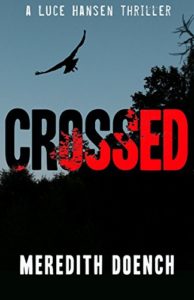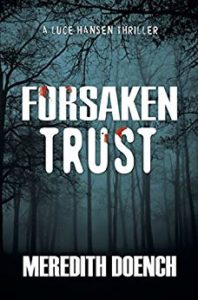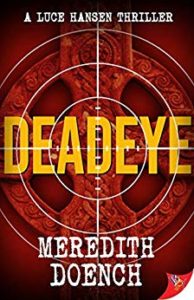An Interview with Meredith Doench
 Meredith Doench has a mission: “I want my writing to contribute to the growing collection of voices that say all stories matter regardless of the character’s sexuality, gender, religion, race, or class,” she says. “Every life counts; we need to be able to recognize ourselves in literature and film.” And contribute she does, both with her writing—the third novel in her Luce Hansen Thriller series, Deadeye, will publish in in July—and her teaching—Meredith is a lecturer at the University of Dayton and teaches creative writing, composition, and literature. This summer, she’s busy promoting her newest book and leading writing workshops, which also push forward that mission, so I’m especially grateful that she took the time to answer a few questions.
Meredith Doench has a mission: “I want my writing to contribute to the growing collection of voices that say all stories matter regardless of the character’s sexuality, gender, religion, race, or class,” she says. “Every life counts; we need to be able to recognize ourselves in literature and film.” And contribute she does, both with her writing—the third novel in her Luce Hansen Thriller series, Deadeye, will publish in in July—and her teaching—Meredith is a lecturer at the University of Dayton and teaches creative writing, composition, and literature. This summer, she’s busy promoting her newest book and leading writing workshops, which also push forward that mission, so I’m especially grateful that she took the time to answer a few questions.
Christina: How did you make the leap from getting a degree in Special Education to writing thrillers? Is there a connection between the two?
Meredith: I earned my undergraduate degree in Special Education and taught in a high school special needs classroom for three years. I wasn’t writing thrillers at that point in my life, but I was writing a lot of short stories and essays. I wasn’t satisfied with my teaching job for many reasons, but mostly because I wanted to do something with writing. A good friend encouraged me to go back to school for my master’s degree and explore the writing field. Once I found creative writing classes/programs at the graduate level, I was hooked.
When I consider my degree in Special Education now, it seems that it prepared me for so much more than a job. Many people and animals in my life have needed assistance or extra help in some capacity at some point in time, and this degree taught me about the resilience of people. It also taught me there is nothing like the sheer determination to succeed despite personal limitations.
The best gift my degree gave me was the tool to meet people exactly where they are, not where they hope to be or where I would like them to be—exactly as they are. These skills have helped me so much in my writing and the building of strong, believable characters. It has helped me to see that what others consider to be a character’s flaw or hardship can become a character’s greatest strength. It’s also helped me to have more compassion and patience, not just with my characters, but with the people and animals in my life.
Christina: Like many authors I’ve met, you also teach. How does teaching influence your writing, and how does writing influence your teaching?
Meredith: I have learned through my teaching that there is so much I still need to learn about creative writing. One of the reasons I love creative writing is because there are countless ways to do it “right.” I am fascinated by the multitudes of ways to combine language and the different points of view my students bring to their writing. I work hard to create an environment in my classes where we all learn from one another. There is always room for improvement in my own writing.
One of the best ways for me to grow as a writer is to engage in discussions about craft with others—we are all writers on some level. I love to go to writing conferences and workshops for this very reason, and I always leave with a few new ideas of how to approach my own writing projects. There is so much reciprocity in the workshop environment and fluctuations of roles between teacher and student—I love that!
Christina: Your Luce Hansen Thriller series is rich with crime details. How do you perform your research for each book? In that research, is there anything you uncovered that you would never consider writing about?
Meredith: I get this question a lot given that the crimes in my books are very detailed. Each book took me quite a bit of time to research. In my first, Crossed, I interviewed police officers and detectives—anyone who would talk to me about their work in law enforcement. I did ride-alongs with officers and did a lot of reading into the rules and regulations of special agents. I also studied specific cases that were like those I was writing. The book Crossed also took a great deal of research into ex-gay ministries and its history, something I didn’t know very much about.
In my second, Forsaken Trust, I was able to use my hometown as a resource for information on opioid abuse and human trafficking. A good friend of mine is a police officer in Ohio, and she was able to provide me with a lot of the information I needed. For the third, Deadeye, a lot more detail was needed than my officer friend could provide. I was very fortunate to meet TJ Turner, a special agent and a great author. (If you haven’t read his books, do so!). TJ was able to provide me with the crucial details about weapons and bullet logistics that this third book required. I’ve been very fortunate to meet and work with officers and special agents who are willing to speak about their experiences and share their time. My books would not have been possible without their expertise.
Christina: Where did the inspiration for Luce Hansen’s character arise?
Meredith: Let me start by saying that I’ve wanted to be a horror writer since the eighth grade. Therefore, much of Luce Hansen is built on the horror genre. If you think of a horror book/movie protagonist, it’s my Luce Hansen. She is an underdog and generally working alone against large forces of evil. She is also an outsider in her world (a lesbian special agent, a woman in a highly populated male work environment). Luce is also very small in stature, something she struggles with in her career, as well as emotionally compromised most of the time. Given these elements, she is not the likely person most would pick to save the day! Luce is very smart, though, and is revered for her ability to track and stop serial killers (that alone has the makings of a horror show!)
In addition, Luce has issues of her own to work with (or through) including addiction, PTSD for the murder of her first girlfriend, and the crushing guilt of knowing she might have stopped that murder if she’d only arrived a little earlier. It devastates her. She also was raised by a single father after her mother left them when she was three. There is a lot going against Luce, just as there are the protagonists in the horror genre, but she is determined to fight evil the best way she knows how. Sometimes the most heroic acts come from those who aren’t necessarily celebrated in in real life. While I have moved on from my desire to be a horror writer, there are still elements of that genre in my writing. In the past few years there has been a shift in my writing from horror to issues of justice.
Another major inspiration for Luce’s character was my own frustration in finding books to read as a teen and young adult about lesbians or women struggling with their sexuality. I was looking for these representations of LGBTQIA in books and couldn’t find them. The sad thing is there were people writing these novels and stories! Granted, I should have asked a librarian for help, but the stigma of LGBTQIA, particularly for teens, kept me (and countless others) feeling isolated and alone. I’ve always loved the quote from Beverly Cleary: if you can’t find the book you want to read, go write it. Well, that’s basically what I did. I never want another teen/young adult to struggle in finding representations of themselves in literature.
Christina: After three books, are you surprised by anything Luce Hansen does?
Meredith: It’s funny, because before I wrote Deadeye, I would have answered no to this question. In this novel, though, Luce surprised me several times. One of the best gifts of Luce’s improved mental health is her ability to show more compassion and concern for others. One of my favorite scenes in the book is one I never saw coming. Luce returns an item to a fallen officer’s family, and she surprised me with her need to meet the family and her insistence they understand how brave and special their loved one was. This scene gave me additional insight into her character and revealed to me more about her feelings of family. It’s moments like these that make writing the novels so exciting and worth every hour I’ve spent with my butt in the chair writing!
Christina: Deadeye releases in a few weeks. How is this book different from the other two in the series?
Meredith: The biggest difference with this novel is that Luce has grown significantly since the first book. Her emotional tenor has changed, for the better, and this gave me the chance to explore different issues with her in this book. I’ll be careful not to spoil anything from Deadeye, here, but Luce is finally ready to confront a major issue she has been struggling with since I met her. It was really freeing to be able to write these scenes that show so much character growth and movement.
The nature of the crimes in this novel are different as well. While Luce is tracking a serial killer (serial killers?), she is taken into areas that she knows very little about and must rely on others for help. This novel delves into the Preppers Movement and survival living skills in very rural areas of Ohio. Luce must seek out the knowledge and expertise of people from many different occupations, and her work becomes much more team-oriented in this novel.
Another change for Luce is that she has come to terms with what family means to her. “Family” can be a very loaded term in the LGBTQIA community for many reasons, and Luce is not atypical in the search for defining “family” and “home” for herself. She has struggled with these concepts through the first two books, but in this third novel we see her making some strong decisions about who and what matters most to her.



Thanks to Meredith for agreeing to this interview! If you know of an author who’d like to be featured in an interview (or you are an author who would like to be featured), feel free to leave a comment or email me via my contact page.
